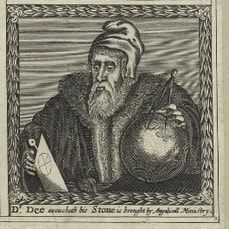
John Dee has been variously described as a visionary, a philosopher, and a “real-life Gandalf.” Internationally renowned, he served at the Elizabethan court as a consultant on matters worldly and otherworldly. The possessor of a legendary library, Dee himself was a legend in his own day, and has remained so ever since. Scholar and scientist, he was also convinced that he could talk to angels. This episode attempts to disentangle fact from fiction.
Podcaster: Lucy
Further Reading
Katie Birkwood, “Letters.” N.H. Clulee, “Astronomia inferior: Legacies of Johannes Trithemius and John Dee.” In: Secrets of Nature: Astrology and Alchemy in Early Modern Europe,” edited by Anthony Grafton and William R. Newman, MIT Press, (2001). John Dee, The private diary of Dr. John Dee, and the catalogue of his library of manuscripts : from the original manuscripts in the Ashmolean Museum at Oxford, and Trinity College Library, Cambridge, ed. James Orchard Halliwell-Phillipps. Camden Society, (1842). The John Dee Society. Dr. Dee’s Magical Mirror. Katherine Eggert, “How to Skim Kabbalah,” in: Disknowledge: Literature, Alchemy, and the End of Humanism in Renaissance England, 110-156, University of Pennsylvania Press, (2015). Andrew Escobedo, Nationalism and Historical Loss in Renaissance England: Foxe, Dee, Spenser, Milton, Cornell University Press, (2004). Charlotte Fell-Smith, John Dee (1527-1608), Constable and Company, (1909). Deborah E. Harkness, John Dee’s Conversations with Angels: Cabala, Alchemy, and the End of Nature. Cambridge University Press, (1999). Margaret Healy, Shakespeare, Alchemy and the Creative Imagination: The Sonnets and A Lover's Complaint, Cambridge University Press, (2011). Christopher Hodgkins, “Once-and-Future Kings: The ‘Matter of Britain’ and Protestant Imperial Recovery from John Dee to Cymbeline,” in: Reforming Empire: Protestant Colonialism and Conscience in British Literature, 10-53, University of Missouri Press, (2002). Seth Lobis, “Deus Londinensis: The Arch-Conjuror of England: John Dee by Glyn Parry.” Huntington Library Quarterly 76:3 (2013): 433-440. Nicholas Popper, “The Arch-Conjuror of England: John Dee by Glyn Parry.” Isis 104, no. 1 (2013): 157-58. “Scholar, courtier, magician: the lost library of John Dee.” William H. Sherman, John Dee: The Politics of Reading and Writing in the English Renaissance, University of Massachusetts Press, (1995). György E. Szönyi, John Dee’s Occultism: Magical Exaltation Through Powerful Signs, State University of New York Press, (2004). Alex Wright, “The Bibliotheca Mortlacensis: John Dee’s Library Catalog and Identity Formation.” Music: "Evening Melodrama" by Kevin Macleod (www.incompetech.com)
1 Comment
|
Site Map |
© 2013-2024 Footnoting History. All rights reserved.
Footnoting History and the Footnoting History logo
are trademarks of Footnoting History, NY. Footnoting History operates under a SAG-AFTRA Micro-Monetized Podcast Agreement. |

